Cabinet Secretariat [Thursday, Nov 17, 2016]
Meeting with the President-elect of the United States
On November 17 (local time), Prime Minister Shinzo Abe visited New York in the United States of America.
After holding talks with Mr. Donald Trump, President-elect of the United States, the Prime Minister said,
“President-elect Trump kindly set aside time during this very busy period with staffing decisions. I believe we were able to truly talk at length and extensively in a frank and candid manner. The meeting took place in a very warm atmosphere.
It gave me confidence that the two of us can build a relationship of trust. As for the content of the meeting, I shared my basic views with Mr. Trump. We discussed a variety of issues.
I would like to refrain from commenting on the details as the President-elect has not yet been officially inaugurated as President, and furthermore, this was an informal meeting. We agreed to meet again at a mutually convenient time to have a broader and more in-depth discussion.”
In addition, in response to a question from a journalist on the Japan-U.S. Alliance and other matters, the Prime Minister said,
“I cannot answer questions about the specifics of the meeting. In any case, our alliance will not function without trust. I came away convinced that President-elect Trump is a leader who can be trusted.”
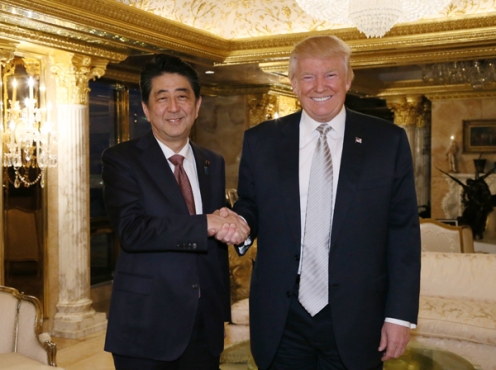
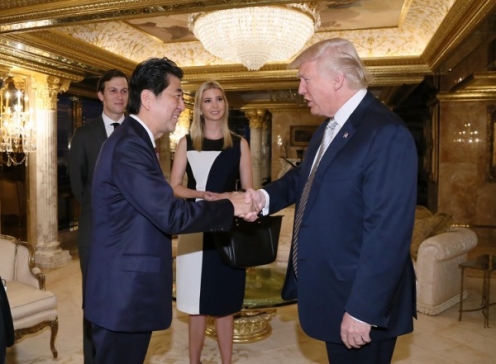
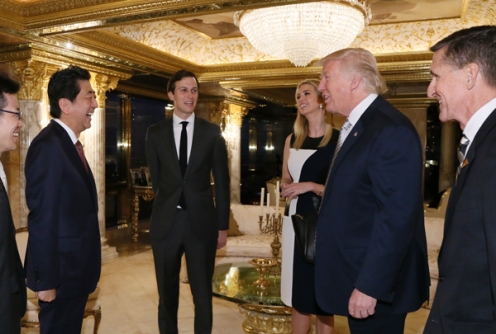
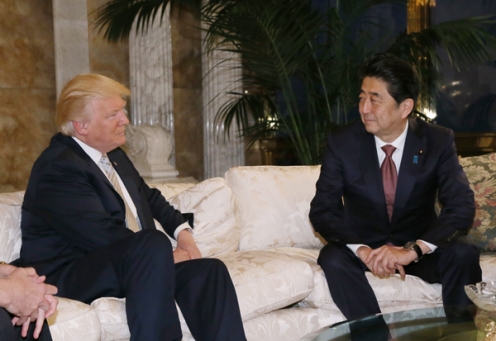
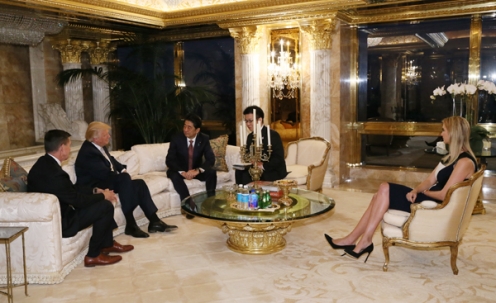
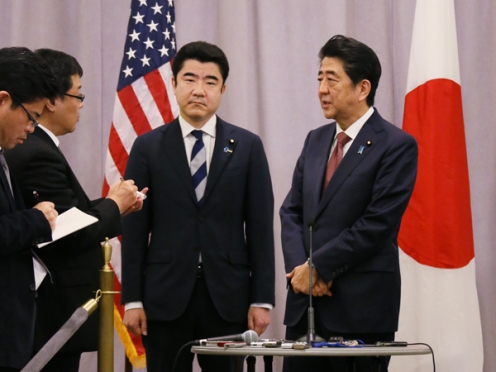
Cabinet Secretariat [Saturday, Nov 12, 2016]
The Leaders of Japan and India Visit Hyogo Prefecture
Prime Minister Shinzo Abe visited Hyogo Prefecture together with H.E. Mr. Narendra Modi, Prime Minister of the Republic of India.
The leaders rode the Tokaido-Sanyo Shinkansen to Hyogo Prefecture. After attending a signing ceremony at the Hyogo Prefecture Guest House in Kobe City, the leaders attended a lunch banquet hosted by the Prime Minister.
Later, the leaders visited a factory specializing in the construction of railway cars in Kobe City, where they viewed Shinkansen cars being fitted, as well as completed Shinkansen bodies.
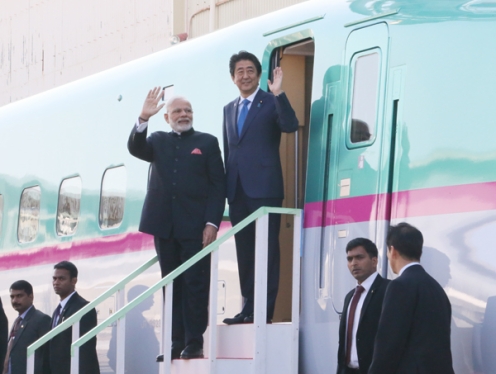
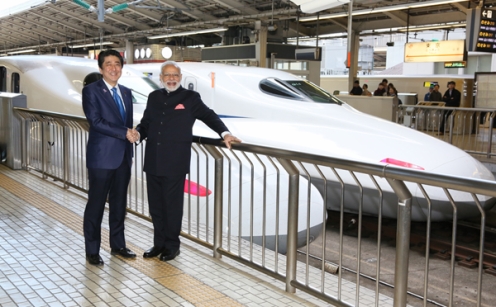
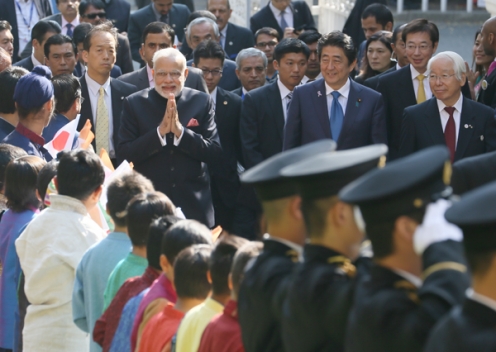
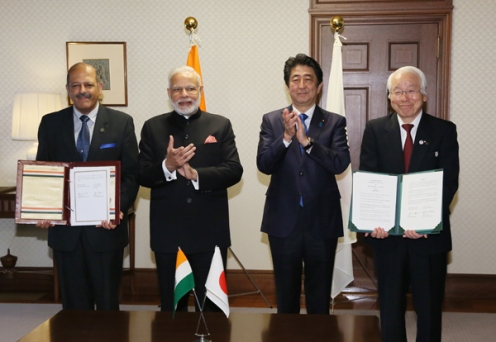
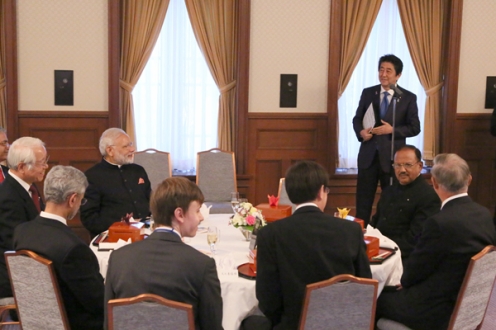
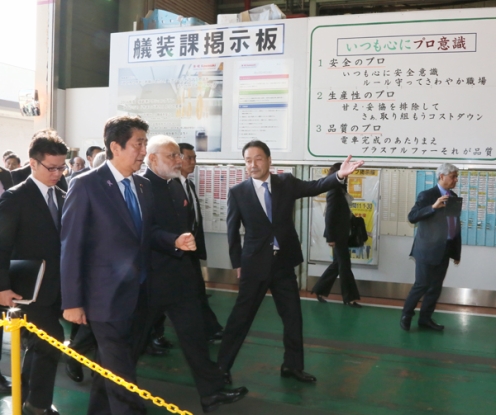
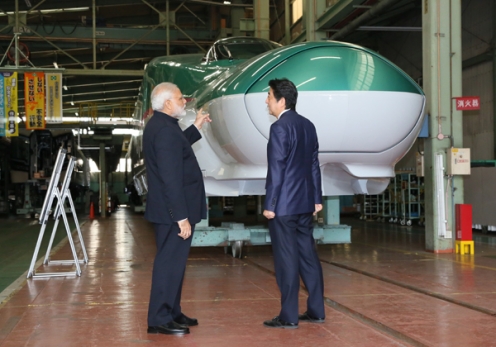
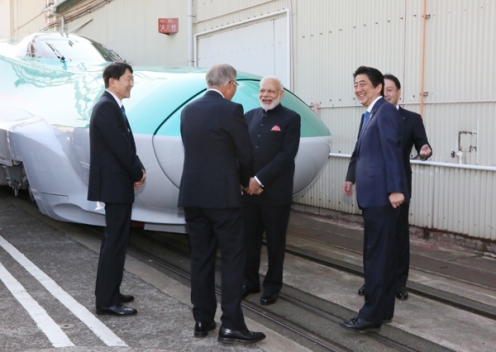
Cabinet Secretariat [Friday, Nov 11, 2016]
Japan-India Summit Meeting and Other Events
Prime Minister Shinzo Abe hosted a summit meeting and other events with H.E. Mr. Narendra Modi, Prime Minister of the Republic of India, at the Prime Minister’s Office.
The two leaders attended a salute and ceremony by the guard of honor and then held a summit meeting. After that, the leaders held a signing ceremony, an exchange of documents, and a joint press announcement.
Lastly, Prime Minister Abe hosted a banquet at the Prime Minister's Official Residence and said in his address,
“I am extremely happy to have been able to invite my good friend Prime Minister Modi back to Japan. I offer my heartfelt welcome to you. In our meeting earlier, we had extensive exchanges of views. This evening, I would like you all to relax and enjoy Japanese cuisine to your heart’s content.
One year ago, I visited Varanasi with Prime Minister Modi, where I had the pleasure of seeing a tremendously magical and beautiful ceremony on the bank of the ‘Mother Ganges’ river. Like the flow of the Ganges River, the friendly relationship between Japan and India has progressed ceaselessly through a long-standing history to this very day. For the Japanese people, India has always been a special and widely loved country, ever since it was known to us as ‘Tenjiku’ long ago. Today, Indian culture, as represented by yoga, movies, Indian cooking, and so forth, has been profoundly embraced by a wide section of Japanese society.
I have heard that work is underway toward the release of a remake of the first Indian film ever set in Japan, Love in Tokyo, next year. It is a romantic comedy that visits tourist sites around Japan. I look forward to seeing it. Together with Prime Minister Modi, I hope to make a heartwarming story out of the Japan-India relationship rivaling that film. Then again, Indian films always have dancing, and I’m not a very good dancer. I’ll leave that part to my wife.
Tomorrow Prime Minister Modi and I will go to Kobe. We will visit a factory that produces Shinkansen utilizing Japanese technology. The Shinkansen pushed forward Japan’s period of high-speed economic growth. I expect that they will become flagships for Japan-India economic relations as well and that the term ‘Shinkansen’ will even come to represent economic growth in India in the future. I hope to greatly mature the relationship between our two countries, which holds an extreme amount of possibilities. I want to construct robust bilateral relations befitting the new era for Japan and India.
To tonight’s banquet, we have invited many leaders, including those supporting the invaluable and friendly relationship of our two countries, and former Prime Minister Mori, who started the strategic partnership between Japan and India. It is thanks to all of you that the Japan-India relationship is so wonderful today. I would like to take this opportunity to express my gratitude to all of you, and my hope that you will continue to work with us toward the further development of this relationship.
I would now like to raise a toast, for the further strengthening of the Japan-India relationship, and for the further deepening the bonds of friendship between our two countries.”
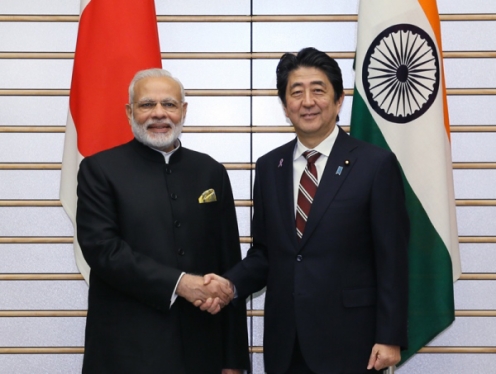
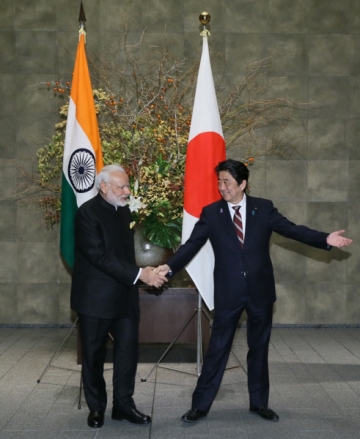

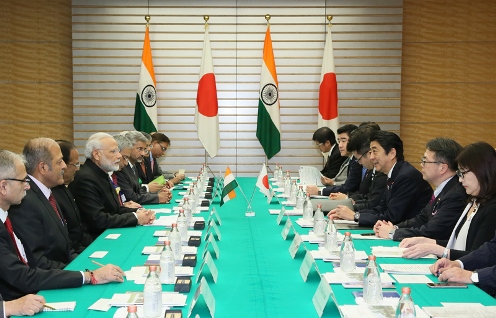
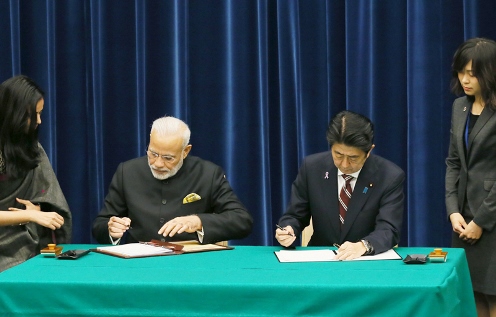
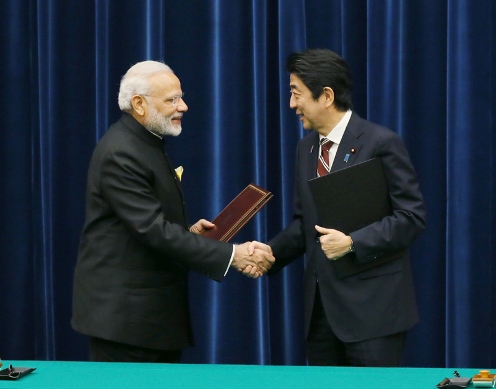
Cabinet Secretariat [Monday, Nov 14, 2016]
Japan-Germany Summit Meeting and Other Events
Prime Minister Shinzo Abe hosted a summit meeting and other events with H.E. Dr. Joachim Gauck, President of the Federal Republic of Germany, at the Prime Minister’s Office.
The two leaders attended a salute and ceremony by the guard of honor and then held a summit meeting. After that, the leaders held a joint press announcement.
Lastly, Prime Minister Abe hosted a banquet at the Prime Minister's Official Residence and said in his address,
“I wish to extend my heartfelt welcome to President Gauck and Ms. Daniela Schadt on their first visit to Japan. In our meeting earlier, we held an extensive exchange of views. This evening, I would like you all to relax and enjoy Japanese cuisine to your heart’s content.
At the Tokyo Olympics and Paralympics, which we are all looking forward to, we will hold a competition for sailing, a hobby of President Gauck.
In fact, when it comes to sports, Japan and Germany are both competing extremely hard against each other as friendly rivals. At the Rio Olympics, we saw some very close and hard-fought matches unfold during the table tennis competition in particular. Although the Japanese Men’s team won, our Women’s team unfortunately lost.
In soccer, unfortunately, Japan does not yet rival Germany, but I hope we can do so someday. I believe there are many people in Japan who follow the Bundesliga with a passion. We are joined today by soccer player Naohiro Takahara, who, along with fellow Japanese players Shinji Kagawa and Makoto Hasebe, are now adored by their supporters in Germany just as much, if not more, as when they played for Japanese teams. It is the dream of Japanese soccer players to be cheered on in a world-class league by the world’s best supporters.
German music is a point of pride for Germany, and there are also Japanese people active in this field as well. Daishin Kashimoto and Sayako Kusaka are both working as first concertmasters in the Berliner Philharmoniker and Konzerthausorchester Berlin respectively.
We have invited to today’s dinner banquet leaders who are active in a range of areas, including politics, the economy, academia, art, and sports.
Thanks to all of you, the relationship between Japan and Germany is what it is today. I would like to take this opportunity to express my appreciation and ask for your continued support for the further deepening of the relationship.
President Gauck, I have heard that, like my wife, you also enjoy dry white wine. I hope you will truly enjoy the Japanese sake and Japanese dry white wine that we are serving tonight.
I would now like to raise a toast, for the health of President Gauck, Ms. Schadt, and everyone here, and for the further deepening of the bonds of friendship that connect the people of our two countries. Zum Wohl! (cheers)”
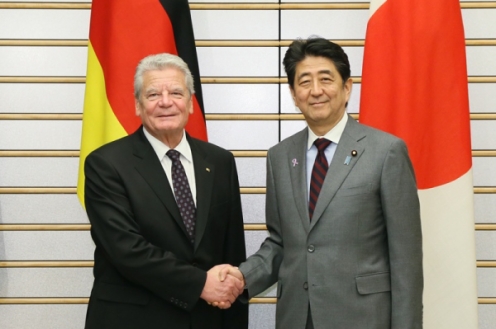
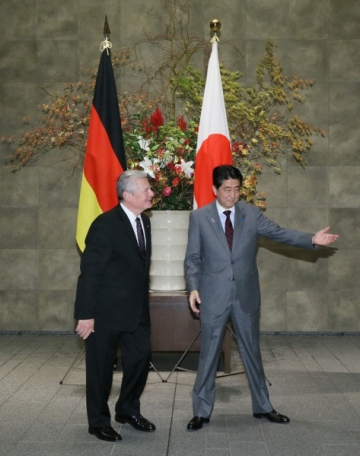
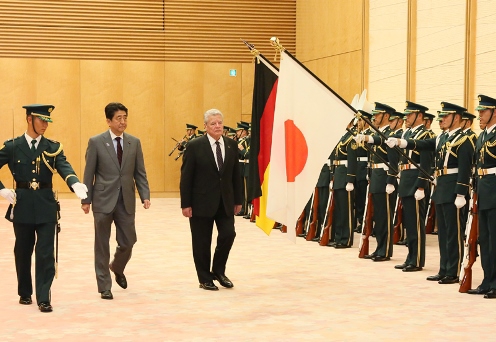
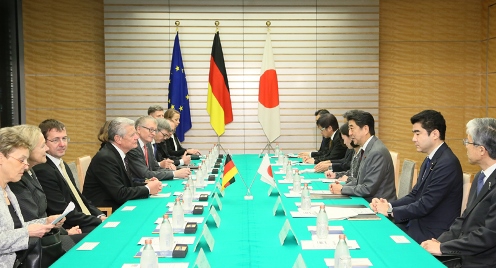
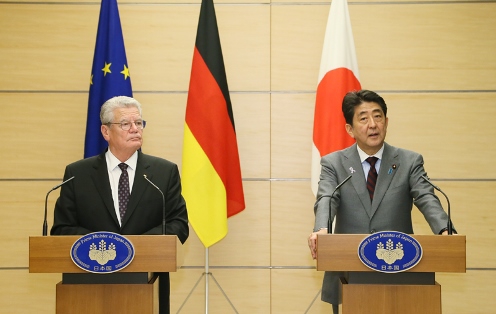
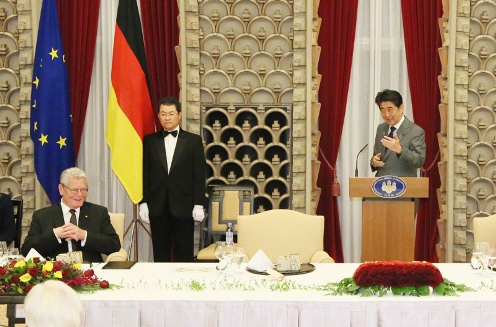
Cabinet Secretariat [Wednesday, Nov 16, 2016]
Japan-Malaysia Summit Meeting and Other Events
Prime Minister Shinzo Abe hosted a summit meeting and other events with H.E. Dato’ Seri Haji Mohd Najib bin Tun Haji Abdul Razak, Prime Minister of Malaysia, at the Prime Minister's Office.
First, the two leaders attended a salute and guard of honor ceremony and then held a summit meeting. Following this, the leaders attended a signing ceremony and exchange of documents, and held a joint press announcement.
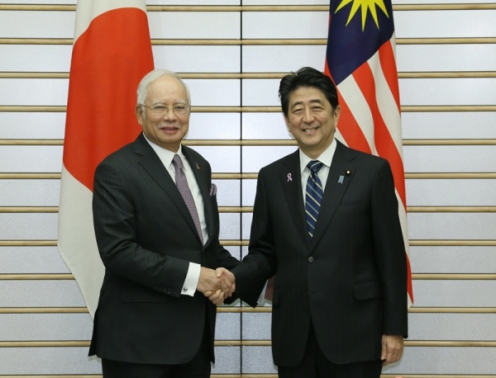
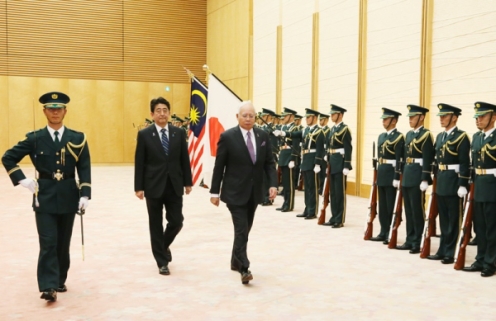
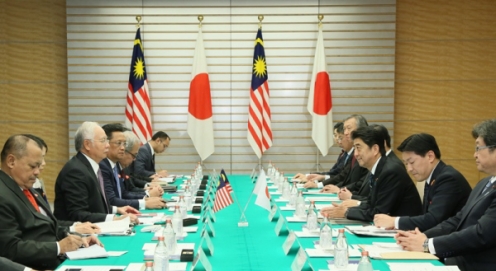
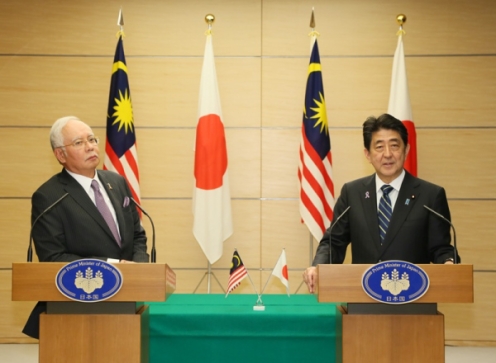
Ministry of Foreign Affairs [Wednesday, Nov 16, 2016]
The Adoption of the Resolution on the Situation of Human Rights in the Democratic People’s Republic of Korea (DPRK) at the Third Committee of the 71st Session of the United Nations General Assembly
1. Japan highly appreciates the fact that on November 16 (November 15 local time), at the Third Committee of the United Nations General Assembly currently being held in New York, the Resolution on the Situation of Human Rights in the DPRK, co-tabled by Japan and the European Union (EU), was adopted by consensus (The resolution has been adopted for 12 consecutive years).
2. Based on last year’s United Nations General Assembly resolution reflecting the final report of the Commission of Inquiry on Human Rights in the DPRK presented in February 2014, the resolution this year condemns the DPRK’s systematic, widespread and gross human rights violations, and urges the DPRK to urgently take measures to end all human rights violations, including the immediate return of all abductees. In addition, the resolution expresses grave concern about the impact of the DPRK’s diverting resources to advance nuclear weapons and ballistic missiles programs on the humanitarian and human rights situation of its citizens. Furthermore, the resolution encourages the United Nations Security Council to take appropriate actions, including through consideration of referral of the situation in the DPRK to the International Criminal Court (ICC) and consideration of the further development of sanctions in order to target effectively those who appear to be most responsible for human rights violations.
3. The consensus adoption of the resolution demonstrates the international community’s grave concerns about human rights violations in the DPRK, including the abductions issue. Japan strongly hopes for the early resolution of the abductions issues and for the improvement in the human rights situation in the DPRK as a whole and continues to strongly urge the DPRK, in cooperation with the international community, to take concrete action towards this end.